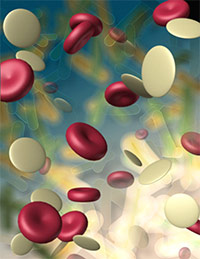
T cells are the warriors of your immune system, but the ongoing battle against cancer can sap them of their disease-fighting powers. New research has discovered crucial information about these “exhausted” cells that can lead to more powerful immunotherapy for cancer.
The fundamental difference between active and exhausted T cells lies in their gene patterns. One example is PD-1, a protein expressed by exhausted T cells that prevents them from attacking both healthy and diseased cells. Checkpoint inhibitors can block PD-1, but their use is productive in only 25 percent of cases.
Can “Exhausted” T Cells Be Revived?
According to Nicholas Haining of Dana-Farber/Boston Children’s, senior author of the report posted in the journal Science, the goal of the study was to determine whether exhausted T cells are simply run-down versions of functional T cells or a separate type entirely. Regulatory regions of T cell genomes were mapped using chronically infected mice as subjects.
Results showed that the two types of cells are controlled by completely different wiring. In a separate study, use of checkpoint inhibitors gave the exhausted T cells a temporary boost, but did nothing to convert them to an active state.
The researchers hope this information will help to improve CAR T-cell therapy, in which T cells are removed from a patient and retrofitted to attack tumor cells. Complete mapping of regulatory regions will provide more precise targets for treatment.
Immunotherapy for Cancer Focuses on Tumors and Their Causes
At Issels®, our integrative programs are aimed at eliminating cancer cells and enhancing your body’s own natural defense mechanisms. Contact us today for more information.